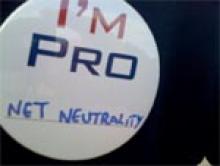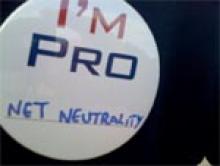Fast, affordable Internet access for all.
network neutrality
Content tagged with "network neutrality"
Minnesota Will Stand for Network Neutrality
Although network neutrality can be easily distracted by partisanship, perhaps it is better viewed through the context of scale and long-term impact. Economically, for example, massive media conglomerates like Fox News, ABC and Disney (who can afford to pay ISPs to favor their content channels) could obtain crucial advantages over new and innovative startup ventures that lack both the cash and clout necessary to strike deals with ISPs.Be sure to attend the FCC Hearing if you are able. Photo used under Creative Commons license from AdamWillis.
Network Neutrality: Google, Verizon, and Us
Understanding - and Rethinking - Broadband Regulation
The stakes are high. The Internet's explosive growth – and the spectacular innovation it spawned – were enabled by common-carrier rules that still govern the nation's dial-up telephone networks. Before 2002, online users were at the center of the Internet and World Wide Web, free to choose among competing ISPs, and free to roam and innovate. With the removal of common-carrier rules, the cable and telephone companies occupied the center of a broadband-driven Web, free to pick winners and losers among innovators (e.g. AT&T's exclusive iPhone deal with Apple) – and free to dictate when and where broadband access will be deployed. In short, the definitive battle for the future of the Internet is underway.
Rules Matter - Network Neutrality and Transparency
Person A: No company would violate network neutrality. Person B: What about Comcast, Cox, RCN, and the famous Madison River Communication? Person A: Those don't count.Aside from the absurdity, the larger problem is that we do not always know when companies are violating network neutrality. Comcast was violating network neutrality for at least a year before tech journalists successfully outed the practice. Over the course of that year, many subscribers called Comcast and asked why they were having problems with certain applications. Comcast lied to them and said the company was not interfering with them. When finally backed into a corner with incontrovertible evidence, it admitted it was.
FCC and Network Neutrality - A Quick Take
Deadline for Network Neutrality Comments Draws Nigh
Network Neutrality and Public Goods
Following up on my recent piece about Comcast and the public interest, I wanted to note some good arguments for network neutrality. Teresa Martin penned a good article for capecodtoday.com that noted:
That notion of the public good is a quaint concept, one that has been bludgeoned out of favor over the past 30 years. But maybe it is time to re-think that a little and to take the concept and re-examine it in the face of the 21st century. Is the Internet part of the larger public good? If so, net neutrality would seem to flow naturally. Does this impede an operator’s ability to make money? Not at all. But it does prevent the asset from flowing to the highest bidder first. It means that information isn’t given priority based on the pocket book of its sender. It means that the recording industry and the movie industry, two strong opponents of net neutrality, can’t use their profits to buy preferred space in the network and block competition.
Photo used under Creative Commons license from AdamWillis.
Comcast, Caps, and the Public Interest
FCC Chair: We Need Network Neutrality
The Chair of the Federal Communications Commission has taken a stand for network neutrality - the founding principle of openness of the Internet. In short, network neutrality means the entity providing you access to the Internet cannot interfere with the sites you choose to visit - it cannot speed them up or slow them down in order to increase their profits. See video at the bottom of this post for a longer explanation.
FCC Chair Julius Genachowski recently spoke at the Brookings Institution [pdf] on the importance of an open Internet. He started by noting many of the ways we depend on services delivered over the Internet:






